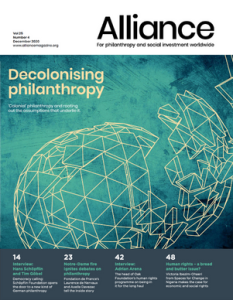As the leader of an African-led humanitarian and development organization and an outspoken advocate for decolonizing aid, I’m heartened that the decolonizing philanthropy feature in Alliance magazine is sparking talk about much-needed change in the sector.
But it’s past time to move from talk to action.
Recall the fanfare back in 2016 at the World Humanitarian Summit, when The Grand Bargain launched with the goal for some of the largest donors and aid providers to funnel 25 per cent of global humanitarian funding to local organizations by 2020. Like many in the Global South, I knew that 25 per cent goal was exactly that – an aspirational goal. In fact, I was one of a group of us who established the notion of ‘20 per cent by 2020’ as a localization target, which later – with the help of allies – bumped to 25 per cent. But the magnitude of the failure to meaningfully move the needle on shifting money and power in the wake of The Grand Bargain is stunning: Signatories’ share of direct funding to local actors still hovers in the single digits. While again, ‘localization’ talks are taking center stage at the United Nations General Assembly (UNGA) and the Clinton Global Initiatives (CGI).
As 2020 came and went, I realized that we needed an alternative mechanism for action for those international NGO leaders committed to collaborating for concrete change. I had recently visited Australia and was blown away by the massive power shifts underway with Australian Red Cross. They were doing the things I’d long been calling for: committing to longer-term, unrestricted funding to national partners (reducing HQ staff to free up funds to make this possible); only working where invited by national and local partners; and using strengths-based fundraising rather than poverty porn. As I shared the promising Australian story with like-minded iNGO leaders elsewhere in the Global North, their genuine interest in real change was clear. We got to work building the Pledge for Change.
Formally launching in late October, the Pledge for Change commits signatories to developing equitable partnerships with local and national organizations (allocating more resources to help those national and local organizations take the lead); engaging in authentic (nonexploitative) storytelling; and advocating for wider change across the aid and development sector. Signatories include iNGOs Oxfam, ActionAid, and CARE. The Pledge’s terms represent a sea change. Of course, I realize it’s one thing to call for shifting more control and money to local organizations, and another to do it. (The last thing I want is a repeat of the 2016 Grand Bargain’s all talk, little action.) Put simply, we need a way to operationalize decolonization.
How does a foundation in, say, Los Angeles, with no presence in Africa know who’s reputable and working in their sector of interest on the ground continents away? How do we help bridge that gap? That’s where the second piece comes in. Adeso is right now testing an online platform designed with and for civil society leaders to connect local and national civil society organizations in the Global South to donors around the world. Critically, this move is designed to open the funding door to bona fide indigenous organizations—those that aren’t simply in-country branches of well-known, well-resourced iNGOs headquartered in the Global North. Dubbed KujaLink, the platform ideally will go a long way toward action once launched in 2023, making it far easier for Global North actors to put their money where their mouth is.
After all, as the saying goes, talk is cheap.
Degan Ali is an internationally-renowned humanitarian leader and organizational development consultant.
New issue: Decolonising philanthropy
 The word ‘decolonisation’ was coined to describe the withdrawal of colonial powers from territories they had occupied. What forms have decolonisation practices taken among foundations? Should philanthropy be making reparations? And what significance does decolonisation have for philanthropic institutions when they are geographically distant from the former colonies? These are among the questions to be explored in the latest issue of Alliance. Guest edited by Shonali Banerjee, Centre for Strategic Philanthropy, Cambridge University and Urvi Shriram, Indian School of Development Management.
The word ‘decolonisation’ was coined to describe the withdrawal of colonial powers from territories they had occupied. What forms have decolonisation practices taken among foundations? Should philanthropy be making reparations? And what significance does decolonisation have for philanthropic institutions when they are geographically distant from the former colonies? These are among the questions to be explored in the latest issue of Alliance. Guest edited by Shonali Banerjee, Centre for Strategic Philanthropy, Cambridge University and Urvi Shriram, Indian School of Development Management.
Subscribe today to read it!






Comments (0)
Thanks for sharing this insightful post, Degan. It's encouraging to see concrete steps towards decolonization in the aid sector. Looking forward to the launch of KujaLink!